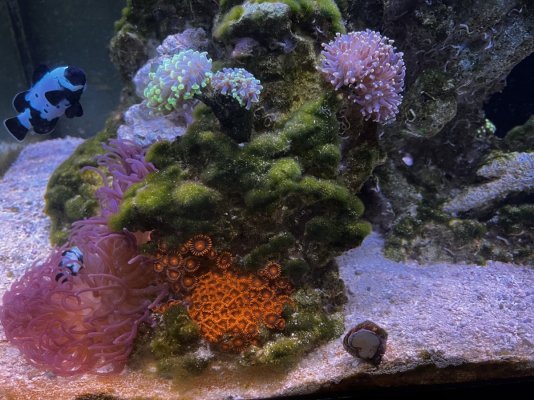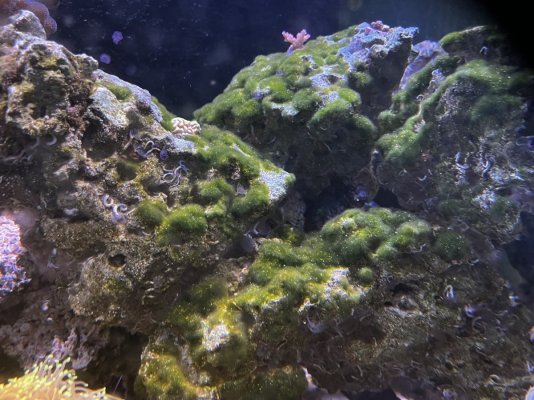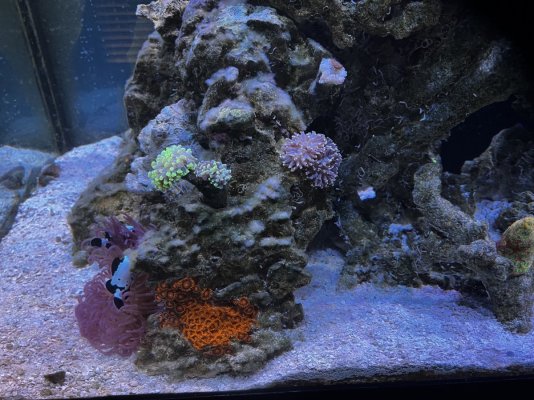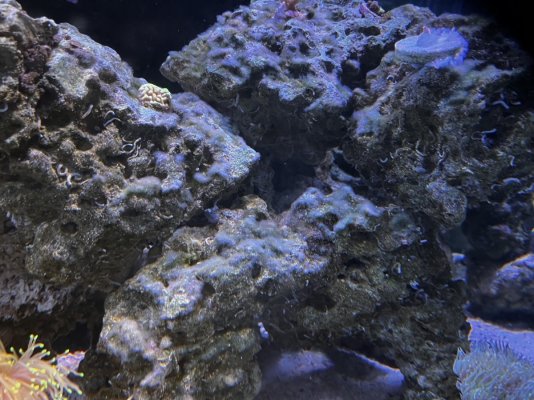I figured I'd give brightwell razor a try in the battle against bubble algae and report back. There's not a lot of threads discussing it's results.
20G nano mixed reef. Everything in it was fat and happy to start. I dosed razor exactly per the instructions. After 5 days, I was thinking "this product isn't doing a single thing" - no noticeable differences whatsoever. Then, within a day, things changed very quickly. The bubble algae started to get it's death sheen - you know that greying out of the green bubble that signals a death soon. Unfortunately, I also noticed some coral affects at the same time. The hardest hit were some of my LPS (acans, blasto, frogspawn, and elegance coral). Additionally, all three of my montipora setosa showed bleaching at the tips, and general poor health / fading of the entire skeleton. (which is weird because those have been pretty hardy). All other corals have polyp retraction and haven't opened back up.
I did a 50% water change two days after the final treatment. My corals have not improved. I'll do another 50% water change this upcoming weekend. I have one acro that has been growing, but wasn't super happy. Razor was rough on the tank, I'm concerned I'll lose that acro and maybe one of the setosas. I noticed a new bubble last night, and it didn't outright kill the existing bubble alage (severely weakened it though). Just a data point, but all in all, I found it rougher on my tank than both vibrant and/or reef flux. Both of which did in my opinion a better job with pest algae.
Not trying to bash, just sharing results because there weren't a lot of posts with results. It did as advertised, and I believe eventually it would have done in the bubble algae. But, it was pretty rough on my corals - probably the roughest additive I've ever added. I'm not willing to continue with maintenance doses.
For what it's worth...
20G nano mixed reef. Everything in it was fat and happy to start. I dosed razor exactly per the instructions. After 5 days, I was thinking "this product isn't doing a single thing" - no noticeable differences whatsoever. Then, within a day, things changed very quickly. The bubble algae started to get it's death sheen - you know that greying out of the green bubble that signals a death soon. Unfortunately, I also noticed some coral affects at the same time. The hardest hit were some of my LPS (acans, blasto, frogspawn, and elegance coral). Additionally, all three of my montipora setosa showed bleaching at the tips, and general poor health / fading of the entire skeleton. (which is weird because those have been pretty hardy). All other corals have polyp retraction and haven't opened back up.
I did a 50% water change two days after the final treatment. My corals have not improved. I'll do another 50% water change this upcoming weekend. I have one acro that has been growing, but wasn't super happy. Razor was rough on the tank, I'm concerned I'll lose that acro and maybe one of the setosas. I noticed a new bubble last night, and it didn't outright kill the existing bubble alage (severely weakened it though). Just a data point, but all in all, I found it rougher on my tank than both vibrant and/or reef flux. Both of which did in my opinion a better job with pest algae.
Not trying to bash, just sharing results because there weren't a lot of posts with results. It did as advertised, and I believe eventually it would have done in the bubble algae. But, it was pretty rough on my corals - probably the roughest additive I've ever added. I'm not willing to continue with maintenance doses.
For what it's worth...






















